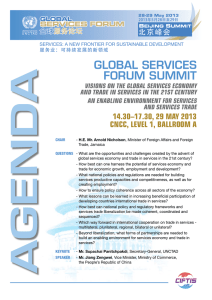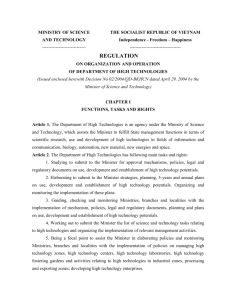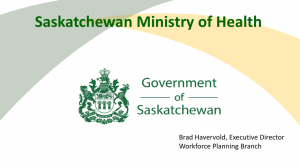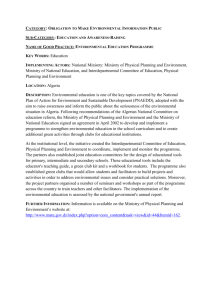Private Health Sector Statement
advertisement
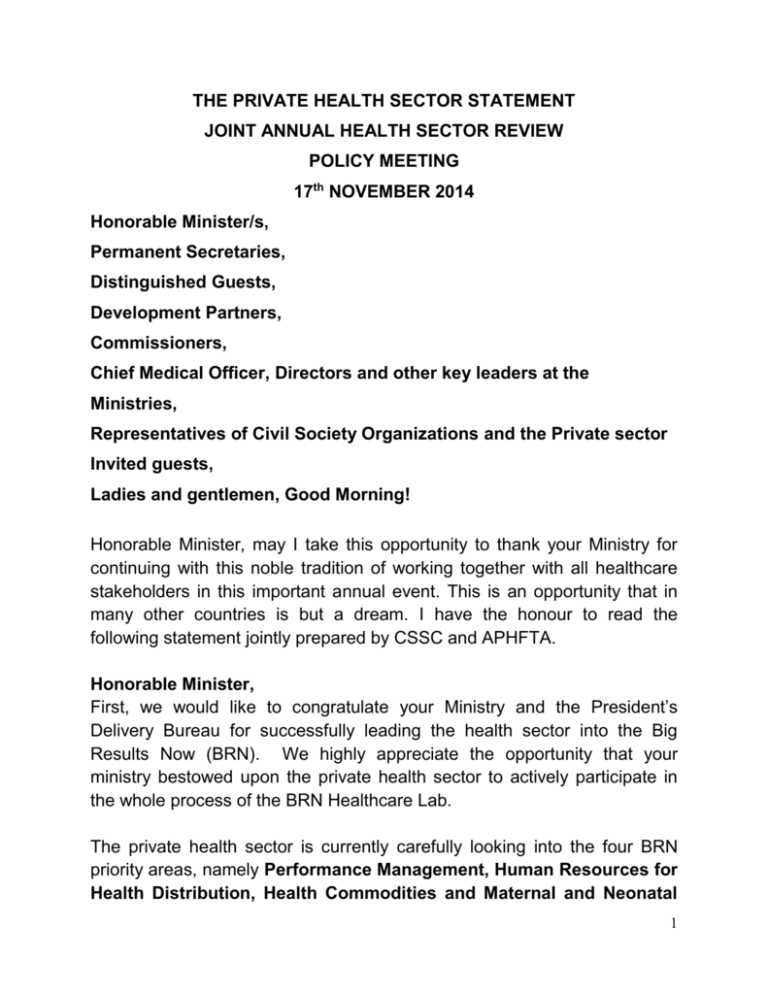
THE PRIVATE HEALTH SECTOR STATEMENT JOINT ANNUAL HEALTH SECTOR REVIEW POLICY MEETING 17th NOVEMBER 2014 Honorable Minister/s, Permanent Secretaries, Distinguished Guests, Development Partners, Commissioners, Chief Medical Officer, Directors and other key leaders at the Ministries, Representatives of Civil Society Organizations and the Private sector Invited guests, Ladies and gentlemen, Good Morning! Honorable Minister, may I take this opportunity to thank your Ministry for continuing with this noble tradition of working together with all healthcare stakeholders in this important annual event. This is an opportunity that in many other countries is but a dream. I have the honour to read the following statement jointly prepared by CSSC and APHFTA. Honorable Minister, First, we would like to congratulate your Ministry and the President’s Delivery Bureau for successfully leading the health sector into the Big Results Now (BRN). We highly appreciate the opportunity that your ministry bestowed upon the private health sector to actively participate in the whole process of the BRN Healthcare Lab. The private health sector is currently carefully looking into the four BRN priority areas, namely Performance Management, Human Resources for Health Distribution, Health Commodities and Maternal and Neonatal 1 Child Health. We support this noble move and we will continue to work with your Ministry to ensure that the Nation achieves the envisioned healthcare goals. In order to achieve the desired goals, both the public and private sector needs to have a common agenda. The technical working groups at your Ministry and the Joint Annual Reviews provide the opportunity for all the stakeholders to review their contribution to the health sector. The recent formation of the Tanzania Public Private Forum, which you personally inaugurated, and the signing of the communiqué between the Ministry of Health and Social Welfare, the Prime Minister’s Office and the Private Health Sector players has proved to the world your Ministry’s Commitment to work with the Private Health Sector in achieving the National Health Agenda, and removing the cloud of mistrust that has lasted for so long between the public and the private sectors. The private health sector now believes that the Ministry of Health and Social Welfare and the Prime Minister’s Office Regional Administration and Local Government Authority will now speed up the process of revising the directive on service agreement so that the self sustaining private health facilities could be allowed to participate in the delivery of healthcare services through the Service Level agreements. It has taken 7 years of discussion on this issue, and I have persistently, for seven years, at each policy meeting, raised this issue. I believe this will be the last time I will be talking about the Service Level Agreements for the Private Self Sustaining Facilities. There is no way the private health sector can participate in the BRN with this restriction in place. Honorable Minister, One of the major health systems building blocks is Human Capital for Health. When the country was gripped by human capital shortage to the 2 extent of calling it a national crisis, there was a call for everyone in the sector to do something about the crisis. The Private Health Sector responded, as usual, and mobilized its membership to invest in healthcare training facilities. The response was enormous! In less than six years, more than 30 private healthcare training institutions have been constructed, and many of them are already operational. Many more are on the pipeline. APHFTA has worked closely with the investors, and has supported the institutions to access affordable loans to enable the completion of these projects. The problem now is getting students to enroll into these institutions, due to the inability to pay the fees, which are quite low compared even to the government spending per trainee in the public training institutions. Your recent meeting with the owners and principals of these training institutions has raised hope for the sector. We fully support your move to help form a fund that will provide loans to the Mid Cadre Health care trainees. We congratulate you for being the first Minister ever at the MoHSW to take time to call a meeting with all the private health training institutions that are under your Ministry, and working together to find solutions for the challenges that the sector is facing. This is putting Public Private Partnerships in practice. Honorable Minister, The private health sector believes that good governance, accountability and transparency are critical for the mobilization and utilization of resources for health care. Both public and private health facilities should strengthen their accountability so that we could collect and use effectively the scarce resources. This has to go hand in hand with the delivery of quality healthcare services at the point of care. The private health sector is now expanding its quality improvement program, with the aim of attaining acceptable international standards. Investments in specialised healthcare institutions are being encouraged. We believe Tanzania is well positioned to be a medical tourist destination. We have the potential. With good policies and accommodating investment climate, there is no reason why this cannot be achieved. What is required is the assurance that, instead of 3 patients being referred abroad, they will be treated in the local specialist facilities. Honorable Minister, Kindly allow me to stress a point on the issue of public health goods. The private health sector has been involved in the delivery of public health goods for many years now. This includes family planning, antenatal care, immunization for women and under fives, tuberculosis services and HIV/AIDS. We believe it is time now for the ministry to have service level agreements for the delivery of these services. This should outline each party’s responsibility, thus encouraging efficiency. It is also time to check on our population growth. Family planning commodities should be available at all facilities, including pharmacies and Accredited Drug Outlets. It is because of the difficulty that’s faced by the private health care facilities to access family planning commodities that has tempted some unfaithful public employees to still the commodities and sell them to the private facilities. We should take advantage of the situation to promote family planning practices. The demand has been created. Why restrict the availability of Depo provera? Why not allow it to flood the market, so that all eligible clients can access it? Our population growth is threatening out economy, and we will not move to the next level without doing something urgently about it. We need full involvement of the private heath sector in this. Honourable Minister, The private sector would like to reaffirm its commitment to continue collaborating with the Government and other partners through PPP in order to attain universal health coverage for all in Tanzania. Furthermore, we are looking forward to fully participate in the process of developing the HSSP IV and its implementation. Thank You. 4
